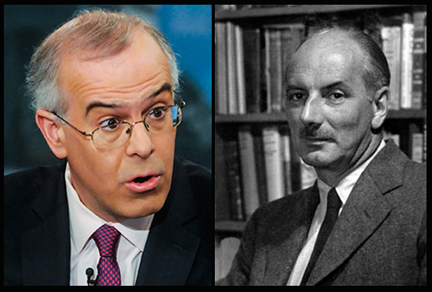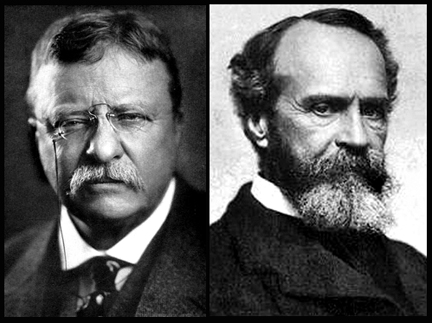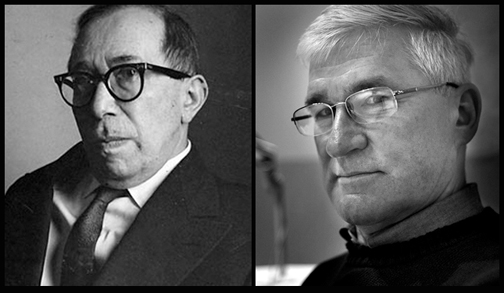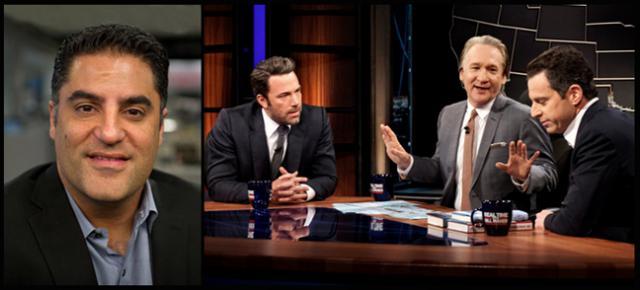I’m a leftist, but I have a weakness for my brothers and sisters on the right. For some reason, I’m compelled to see what troglodytes like Bill O’Reilly, Sean Hannity and Megyn Kelly are thinking. They’re all quite entertaining as they do their best to un-man Barack Obama and advocate day-in, day-out for war with Islam. They are masters of malicious fog.
Then there’s a writer like New York Times columnist David Brooks, a man who must sit around observing current events until he figures out a safe, center-right position he can express in the most reasonable, muddled language possible. Reading David Brooks is like trying to get a grip on jello.
In this current political swamp there’s also writers like Cenk Uygur, a Turkish naturalized US citizen who left the Muslim religion behind to become an on-line journalist. He did a stint with MSNBC and now is the main man on The Young Turks show. Once a Republican, he’s moved left to the progressive side. His recent effort at clarity concerning the question whether “Islam is the motherlode of bad ideas” was brilliant. The topic was a TV exchange among Bill Maher, Sam Harris and Ben Affleck. Harris made the “motherlode” remark. Maher compared Islam to the Mafia. A pissed-off Affleck said they were both talking bigotry.
 David Brooks and Lewis Mumford
David Brooks and Lewis Mumford
Brooks’ October 3rd column was called “The Problem With Pragmatism.” Annoyed at “people who try to govern without philosophic or literary depth,” Brooks linked Liberalism with Pragmatism and, with some help from Lewis Mumford and an essay in the 1950s New Republic magazine, trashed pragmatism as not up to speed for our moment in history, a moment suddenly taken over by more military adventure in the Islam-saturated deserts of Iraq and Syria. Citing Mumford, Brooks writes of our national mission and how “only people with an aroused moral sense will be properly mobilized to stand up for humanity.”
Lewis Mumford seems an odd inspiration for Brooks’ soft, center-right paean to our current moral mission. Mumford wrote a lot about cities and architecture. He felt human communication, more than the use of tools, was the secret of human advancement. One imagines he would be appalled how secrecy now impedes so much human communication. Mumford was critical of advertising and marketing and of the growing use of credit — all now on steroids in the holy pursuit of corporate profit. He didn’t like things like built-in obsolescence and product changes based on superficial fashion; again, fundamentals of our dysfunctional national condition. Mumford advocated well-made products that would last and be re-used by succeeding generations. He advocated biodiversity. He is said to have influenced people like Jacques Ellul, Witold Rybczynski, E. F. Schumacher, Herbert Marcuse, Thomas Merton, and Marshall McLuhan. How such a writer could be critical of pragmatism I can’t fathom.
The popular American purveyor of Pragmatism was, of course, William James, who is considered by many educated Americans as our most American philosopher. The fact a reader can understand and follow James’ prose does not mean he is “without philosophic or literary depth.”
Jack Nicholson’s Marine Colonel Jessup became a cultural icon for declaring on the stand that liberals “can’t handle the truth.” Brooks seems to be saying something akin to this about pragmatists. He quotes Mumford: “Life is not worth fighting for: bare life is worthless. Justice is worth fighting for, order is worth fighting for, culture … is worth fighting for; these universal principles and values give purpose and direction to human life.”
So why is Brooks condemning pragmatism? I had to wonder if he had, like me, watched and absorbed all 14-hours of the Ken Burns PBS Roosevelt documentary. I was most moved by the liberalism and pragmatism of Franklin and Eleanor Roosevelt as the country struggled against depression. I suspect Brooks was more moved for today’s challenges by the bully passions of Teddy Roosevelt, the nation’s prototype global imperialist — also known for his limited domestic progressivism. Brooks closes his column on a classic bullmoose note by declaring, “lofty political idealism is out of favor.” He calls for “leaders who understand evil down to its depths, who have literary sensibilities and who react with a heart brimming with moral emotion.”
 Teddy Roosevelt and William James
Teddy Roosevelt and William James
Here, it needs to be noted that Teddy Roosevelt and William James were contemporaries very much at odds on issues of war and peace, especially in 1910 after Roosevelt reluctantly turned the White House over to Taft. Roosevelt was publishing essays in 1910 advocating the United States’ duty to intervene militarily to manage nations that he deemed could not manage themselves. War was the ultimate arena for manliness.
The pragmatist James spoke out against this view. In a famous 1910 essay, “The Moral Equivalent of War,” he refers to “Roosevelt’s weaklings and mollycoddles,” epithets no doubt aimed at him. The point of the essay is not the elimination of the military, but to put it in its place and to re-channel militarist energy to neglected domestic issues. “The only thing needed henceforward is to inflame the civic temper as past history has inflamed the military temper.” He saw imperial military adventurism as a vain and destructive waste of resources when there were so many important civic demands that needed addressing.
“Reflective apologists for war at the present day all take it religiously. It is a sort of sacrament. . . . human nature at its highest dynamic. Its ‘horrors’ are a cheap price to pay for rescue from the only alternative supposed, of a world of clerks and teachers, of co-education and zoophily, of ‘consumer leagues’ and ‘associated charities,’ of industrialism unlimited and feminism unabashed.”
Typically humble, in the essay “What Pragmatism Means,” James credits Charles Pierce for creating Pragmatism in 1878 in an essay called “How to Make Our Ideas Clear.” He elaborated on Pierce’s notion of clarity. “The pragmatic method is primarily a method of settling metaphysical disputes that otherwise might be interminable.” The focus of this enterprise, he writes, “is to try to interpret each notion by tracing its respective practical consequences.”
The point is to be clear and avoid abstruse and elite academic language that, too often, obscures meaning and befogs rather than enlightens. One of the more egregious examples of such elite befoggery, of course, was Leo Strauss, the intellectual father of the neo-con movement. His philosophical writing was notorious for being written on two levels — one literal and one between the lines intended for initiates. Since he was advocating things like domination by an elite, the philosophical language of befoggery served his purpose well with students like Allan Bloom, Irving Kristol, Paul Wolfowitz and Richard Perle, many of the people who brought us the Bush/Cheney Iraq War.
 Leo Strauss and Andrew Bacevich
Leo Strauss and Andrew Bacevich
Consider Andrew Bacevich, professor of International Relations and History at Boston University. He’s a retired Army full colonel who lost a son to combat in Iraq. He’s also been linked with the pragmatic school of writing. In 2012, he edited a book of essays called The Short American Century: A Postmortem. He describes the book as “a dissenters’ guide to the American Century,” the latter a term he points out was coined by publisher Henry Luce in the 1950s. He says Americans need to be “discomfit(ed)” from their nostalgic attachment to this past.
“Put simply, the conditions that once lent plausibility to visions of an American Century had ceased to exist. . . . [T]he world itself had changed. Contemporary reality no longer accommodated the notion of a single nation arrogating to itself the role of global Good Samaritan, especially a nation with dirty hands.” The days of Teddy Roosevelt belligerence are over, whether one likes the fact or not.
Brooks’ attack on pragmatism, linked with the much-demeaned term liberal, is classic befoggery, in this case, intent on undermining the clear, pragmatic thinking of people like Bacevich who question those advocating a passionate renewal of The American Century. The problem is, David Brooks won’t come out and clearly say that. Why? Because the idea of domestic American Renewal is not the same thing as revitalizing Imperial American Militarism, which is what the current reality is about beneath all the layers of fog and dishonest verbiage.
Here’s where Cenk Uygur hits it out of the park. His pragmatic, clear dissection of the Bill Maher imbroglio over radical Islam is worth watching, given the sad fact at this war-feverish moment even liberals like Maher are spouting blanket demonizations of Islam. Uygur shows why this stuff is not only inaccurate, it’s dangerous.
 Cenk Uygur dissects Ben Affleck, Bill Maher and Sam Harris on Islam
Cenk Uygur dissects Ben Affleck, Bill Maher and Sam Harris on Islam
It’s ultimately just wrong that Islam is our problem; the problems we face are actually cultural. For instance, Uygur asks, why isn’t US bombing deemed “Christian” or Israeli bombing of Gaza deemed “Jewish?” With all the death dished out, why aren’t these religions damned as “motherlodes of bad ideas” in the same fashion the atheist Harris damns Islam? The reason is simple: cultural and political differences are the real problem.
One of our culture’s problems right now is rotten leadership incapable of facing the facts of current and future life vis-a-vis a history of self-congratulatory imperial glory. Congress is completely corrupted by money, and the President of the United States is, as Uygur says, “coasting.” In this sense, he agrees with Brooks about the need for inspired, passionate leadership; but he’s looking at it from the progressive side of the spectrum.
Brooks is dead wrong: what we need is more pragmatism capable of facing hard truths about the nation. Norman Mailer once ran for mayor of New York on the platform “No more bullshit.” Since then, Yale philosophy professor Harry Frankfort has elevated the term bullshit into the realm of pragmatic philosophy. Responsible, hard-working, free-thinking Americans have to somehow take the nation back from the elite bullshitters who give a higher priority to corporate profits and imperial military adventures than they do to the sorts of things William James fought for: maintaining the nation’s infrastructure; educating its youth; developing an understandable and honest healthcare system; generating more jobs, and, yes, facilitating a fair and equitable redistribution of wealth. That’s what will renew America.
